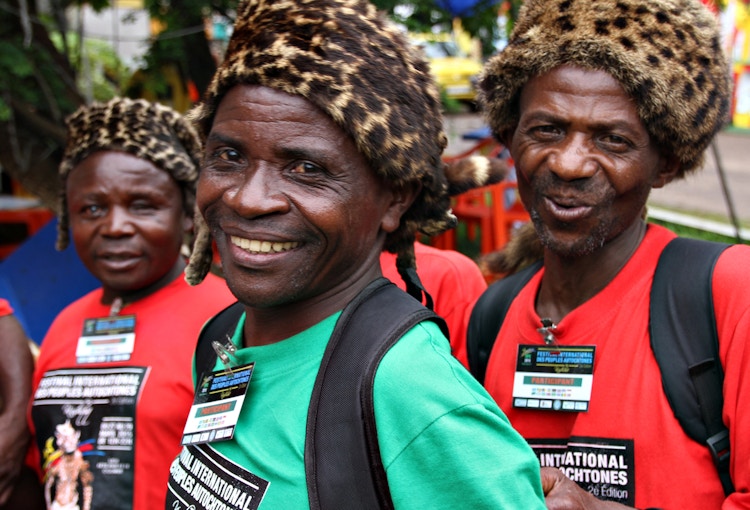Historic decision recognises rights of Indigenous Batwa people
The Batwa people of the Democratic Republic of the Congo have won significant recognition in the African Commission on Human and Peoples' Rights. This comes after a decade-long battle supported by Rainforest Foundation Norway.

INDIGENOUS: A family of Indigenous people in the Democratic Republic of the Congo. Photo: Johan Wildhagen
By Rainforest Foundation Norway.
In a landmark communication made public in July 2024, the African Court on Human and Peoples' Rights condemned the forced evictions of the Batwa from their ancestral lands, depriving them of their traditional way of life and means of subsistence. To remedy these fundamental human rights violations, the African Court made a series of detailed recommendations to the Congolese authorities. These recommendations aim to guarantee the Batwa's right to their ancestral lands and call on the government of the Democratic Republic of the Congo (DRC) to establish a mechanism to recognise and protect these rights.
"This is not only a great victory after years of campaigning for the recognition of Batwa peoples' rights and the reparation of the human rights violations committed against them since the 70s. It is an important step for recognising Indigenous peoples across Africa and their rights to traditional lands," said Alexandre Becquevort, Head of the DRC country team in Rainforest Foundation Norway.
Decisive step in rights recognition
Furthermore, the Commission emphasises the importance of full and meaningful participation of the Batwa in decision-making processes that affect them, as well as the implementation of economic development programs tailored to their specific needs. To ensure transitional justice, the Commission also recommends the creation of mechanisms allowing victims to seek reparations and promote reconciliation between communities.
"The decision marks a decisive step in recognising the rights of these vulnerable communities to land and natural resources. The implementation of this decision by the Congolese government requires effective support measures so that the Batwa continue to play their traditional role of living in harmony with the biodiversity as a people who embody conservation values," declares Jean Marie Bantu, ERND project manager.

FESTIVAL: Batwa peoples' rights activists attending a festival of Indigenous peoples in Kinshasa, the capital of the DRC. Photo: Brita Ingebrightsen/RFN
Victims of wildlife conservation
The creation of Kahuzi-Biega National Park in the DRC in the 1970s led to the forced eviction of the Batwa, an Indigenous hunter-gatherer people. Considered a threat to wildlife conservation, the Batwa were dispossessed of their ancestral lands without adequate compensation despite promises made by the then-Zairian authorities.
The Batwa were victims of systemic discrimination based on their ethnicity and traditional way of life. Deprived of access to basic services such as health, education, and justice, they also saw their cultural rights violated. The eviction forced them to abandon their ancestral way of life, leading to profound suffering and social marginalisation.
A ten-year legal battle
Faced with this injustice, the Batwa, represented by Environnement Ressources Naturelles et Développement (ERND) and supported by Rainforest Foundation Norway (RFN), waged a legal battle at the national level for over a decade. ERND, a Congolese organisation, worked to document violations, support Batwa communities, and engage in dialogue with local authorities, with technical and financial support from RFN.
Meanwhile, the Minority Rights Group International (MRG) provided legal expertise and mobilised the international community's support. MRG was crucial in bringing the Batwa's case before the African Commission on Human and Peoples' Rights (ACHPR) at the African level.

VILLAGE: An Indigenous village in the Congolese rainforest. Photo: Johan Wildhagen
Reparation and future rights realisation
"The work is not done yet. Now, it's time for the Congolese
government to step up and ensure the reparation and restoration of
ancestral lands, as well as implement a legal framework and social
mechanism that secures the human rights of the Batwa people, including
measures that preserve their cultural heritage and identity," said
Alexandre Becquevort, Head of the DRC country team in Rainforest
Foundation Norway.
Rainforest Foundation Norway is now working together with human rights organisations and development partners to:
- Mobilise substantial funding from donors, foundations, and governments to support the implementation of these reparation agreements and long-term development projects.
- Develop programs to protect and promote indigenous cultures in collaboration with Batwa communities to preserve their heritage and identity.
- Support the creation of mechanisms for consultation and participation of indigenous peoples in local, national, and international decision-making processes.
- Advocate for legislative reform in the DRC to align the national legal framework with international standards on the rights of indigenous peoples.
RFN denounces outdated conservation practices that violate the rights of local communities and indigenous peoples. RFN calls for a more inclusive approach to sustainable forest management based on respect for human rights and ancestral knowledge. By implementing the African Commission's recommendations, the DRC will not only be able to remedy the injustices suffered by the Batwa but also lay the foundations for a model of sustainable forest conservation that places the rights of local communities at the heart of its concerns.
For comments and more information, contact:

Alexandre Becquevort
Country Director, DRC
alexandre@rainforest.no